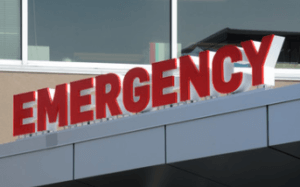
When should I go to Urgent Care? Illness or injury can appear or happen out of nowhere. Waking up in the middle of the night with abdominal pain, cutting your finger while making dinner, or a severe chest pain out of the blue. When situations like this occur, it’s often difficult to know where to go.
Medical conditions requiring rapid or advanced treatments (such as surgery) and life-threatening emergencies, such as a heart attack or serious head injury, require a visit to the emergency room (ER). Dial 911 immediately for any life-threatening medical problem.
An illness or injury that does not appear to be life threatening or in need of advanced treatment but can’t wait until the next day to be seen can probably be treated at an urgent care center. VIP Urgent Care centers can provide easy access to quality healthcare for the times when your primary care physician’s office is closed. Our medical expertise and commitment to personalized attention ensure that patients with urgent health needs receive the very best care when they need it most.
Medical Conditions Considered Urgent
Urgent care centers are for when you can’t wait for an appointment with your doctor,
but you don’t quite need an emergency room.
Some examples include:
- Fever without a rash
- Accidents and falls
- Small cuts that may require stitches
- Wheezing or shortness of breath
- Diagnostic services, including X-rays and laboratory tests
- Eye irritation and redness
- Fever or flu
- Minor broken bones and fractures in fingers or toes
- Moderate back problems
- Severe sore throat or cough
- Skin rashes and infections
- Sprains and strains
- Urinary tract infections
- Vomiting or persistent diarrhea
- Dehydration
Emergency Medical Conditions
Always head to the ER when life or limb are at risk.
The staff there is ready for any critical situation, 24/7.
Again, dial 911 immediately for any medical problem that appears life-threatening.
Some examples of conditions that need emergency medical care include:
- Slurred speech
- Head or eye injury
- Fainting/change in mental state
- Compound fracture, which involves a bone protruding through the skin
- Convulsions, seizures, or loss of consciousness
- Deep knife wounds or gunshot wounds
- A newborn with a fever less than 3 months old
- Heavy, uncontrollable bleeding
- Moderate to severe burns
- Poisoning
- Pregnancy-related problems
- Serious head, neck, or back injury
- Severe abdominal pain
- Severe chest pain or difficulty breathing
- Heart attack symptoms, such as chest pain that lasts longer than two minutes
- Stroke symptoms, such as vision loss, sudden numbness, weakness, slurred speech, or confusion
- Suicidal or homicidal feelings
- Concussion/confusion
- Fever with a rash
- Facial lacerations
- Serious burns
This general information is not intended to diagnose any medical condition or to replace your healthcare professional. If you are displaying very serious signs such as an inability to wake up, seizures, or repeated vomiting, it is a time-sensitive medical emergency and you should seek immediate care and proceed to the emergency room immediately.
